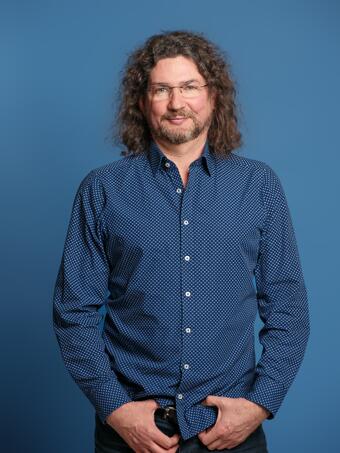Supplementary study Multimedia

Overview
The Academic Minor in Multimedia teaches music students and students of music and dance pedagogy to master the media applications they need for their career entry and professional advancement. In addition, this minor encourages and nurtures students’ skills in expressing themselves creatively with media support, and challenges them to reflect critically on intermedia developments.
Contact
iwan.pasuchin@moz.ac.at
peter.schmidt@moz.ac.at
Basic module
12 ECTS-CREDITS
Advanced module
12 ECTS-CREDITS
Download
General Information
In the 21st century, mastering media technologies is one of the basic requirements for a successful career for both artists and teachers in artistic disciplines. Among other things, they are expected to have the skills to produce and publish high-quality audio and video productions (e.g. for competition submissions or as documentation of performances and educational projects), to design graphic (advertising) materials and to present themselves and their work professionally on the internet and on social media channels.
Furthermore, artificial intelligence (AI) tools offer potential to support artistic practice, educational work and media presence. Beyond the knowledge of individual applications, the ability to recognise interactions between different aesthetic and media forms of expression (lntermedia) in social contexts is becoming increasingly important in order to be able to deal productively, critically and creatively with the associated convergences - e.g. in the field of social media and in the implementation of interdisciplinary artistic and educational projects.
The main aim of the Multimedia programme supplement is to enable students to master the media applications they need for their career entry and professional advancement. In addition, this minor encourages and nurtures students’ competences in expressing themselves creatively with media support, and challenges them to critically reflect on and engage with intermedia developments in the age of AI.
Basic module
The courses in the basic module teach essential skills in the use of current media technologies and encourage students to reflect on their use. Students learn how to create audio and video recordings of their own performances or those of their pupils and how to edit them in such a way that they can be published on various channels. They are also introduced to the basics of graphics editing and learn how to design websites. In addition, students gain an insight into intermedia creative production and computer-aided work.
The following courses are compulsory:
- VU Fundamentals of New Media BA (2 SWS/2 ECTS-Credits)
- VU Fundamentals of Sound Engineering BA (1 SWS/1 ECTS-Credits)
- Note: The VU Fundamentals of Audio Engineering can be replaced by an equivalent course in consultation with the head of the academic minor.
- Electives: In addition, courses recommended for the basic module must be selected from the programme offered by the Mozarteum University Salzburg (9 ECTS-Credits).
Advanced module
The advanced module builds upon the skills, abilities and knowledge acquired in the basic module. One focus of the module is on advanced and Al-supported media applications; the other special focus is on creative expression in the form of transmedial and artistic-crossover project work and reflection on inter-media interactions in social contexts. In some cases, depending on the courses currently offered by the department, it is possible to set an individual focus. The courses of the advanced module are to be chosen from the recommended programme offered by the Mozarteum University Salzburg (12 ECTS-Credits).
This academic minor is aimed at students of music and those studying music and dance pedagogy at the Mozarteum University Salzburg, i.e. instrumental and vocal performance, composition, music theory, conducting, instrumental and vocal pedagogy, music education, instrumental music education and music and dance/movement pedagogy.
The academic minor can be taken by all students of the Bachelor's, Master's, Diploma and, if applicable, Doctoral degree programmes listed. Students of other degree programmes can take the academic minor within the scope of the electives required by their curriculum, subject to available capacity.
The academic minor in Multimedia can only be completed by students at the Salzburg campus.
The participation in courses from the academic minor is possible within the scope of the free elective course that students are required to complete for their degree programme. If a student does not complete the number of credits required to be awarded the full academic minor, the certificates from the individual courses can be used as credits for free electives.
Students have the opportunity to obtain a certificate for the basic module (12 ECTS-Credits) as well as for the advanced module (12 ECTS-Credits). The following certificates can be applied for after successful completion of the courses for the academic minor:
- A certificate for the basic module of an academic minor will be issued after positive completion of courses with different content (including the two compulsory courses) amounting to at least 12 ECTS-Credits.
- A certificate for the advanced module of an academic minor will be issued after successful completion of further courses of different content amounting to at least 12 ECTS-Credits.
The examination certificates for the courses must be submitted in the specified digital form (individual certificates in PDF format as well as a list of courses) to the head of the respective academic minor programme so that the necessary verification checks can be carried out. The certificates are then issued by the Department of Studies & Examinations at the Mozarteum University Salzburg.
The academic minor Gender I Diversity I Arts is organised and coordinated by the Department of Music Education at the Mozarteum University Salzburg. The course programme is compiled on a semester-by-semester basis, with additional courses being offered as required.
Which courses take place as part of this academic minor?
The current courses on offer are announced each semester.
How do I register for individual courses?
Registration takes place via MOZonline. If external university courses are taken as part of an academic minor, you must also register with the organising university (e.g. Paris Lodron University Salzburg).
How are academic minors recognised and certified?
Certificates obtained for academic minor programmes can be used twice:
- In the case of a sufficient number of certificates for the basic or advanced module (12 ECTS-Credits each) of the respective academic minor or study focus.
- As credits required to be taken in free electives (provided they are not compulsory subjects of your own degree programme).
How is the certificate issued?
Certificates for academic minors at the Mozarteum University Salzburg:
After completing the required 12 ECTS-Credits for the basic module or advanced module, the courses must be entered in the course list and sent by email, together with individual certificates in PDF format, to the respective head of the academic minor for verification. After the review, the head of the academic minor programme must forward the documents to the Department of Studies & Examinations so that the certificate can be issued. The certificate must be collected from the Servicepoint of Mozarteum University Salzburg, Mirabellplatz 1.

